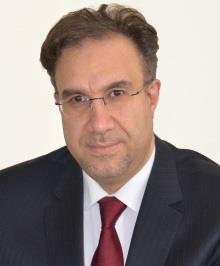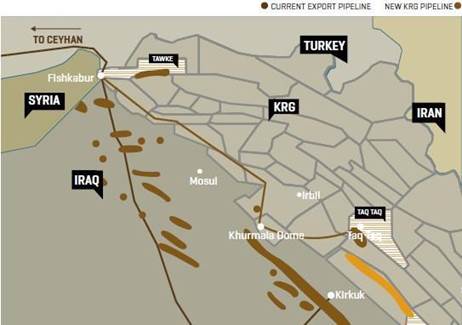In Iraq, the journey to prosperity and success will be much faster this time around – we did it 5,000 years ago, and we will do it again.
Turkey’s insatiable demand for energy to sustain its growth and development has seen it casting aside its traditional suppliers as it looks to the Caspian region and Iraq to secure its energy requirements.
According to the OECD’s International Energy Agency (IEA), Turkey’s spending on energy imports reached $60bn last year. Being at the crossroads of Asia and Europe, it has become a key energy transit country. With the IEA predicting a doubling of global energy demand by 2040, Turkey’s importance is only set to increase.
Attending the 3rd Caspian Forum in Istanbul last month, I witnessed attempts to create a Southern European or Northern Middle East Energy Union. The event, like so many recent oil and gas forums, centred upon how energy security impacts upon global supply and demand, and for me put the spotlight on the recent dynamics between Turkey, Iraq’s central government and the Kurdistan Regional Government (KRG) of northern Iraq over the building of an oil pipeline directly linking the KRG to Turkey. This pipeline could eventually reshape the northern part of the Middle East, and it could have drastic consequences for regional security even if a tentative legal consensus between the three parties is reached.
Turkey’s Peace Pledge
At the 2nd Caspian Forum in New York last September, Turkey’s Foreign Minister Ahmet Davutoğlu said that Turkey’s “southern corridor is connecting several regions, several countries around the same objective of getting reliable energy but at the same time getting peace.” This statement was supported by the attempts of Energy Minister Taner Yildiz to achieve a trilateral agreement between Ankara, Baghdad and Erbil to secure economic prosperity and harmony for all. Such efforts are encouraged and welcomed by Baghdad – they are closely linked to the core values of Iraq’s state-building and nation-building efforts; one would hope they don’t derail from these principles.
In December 2012 Mr Yildiz failed to make it to Erbil for the Iraq Kurdistan Oil & Gas Conference, as his flight was refused entry to Iraqi airspace without prior permission from the federal government in Baghdad (MEES, 7 December 2012). He did make it to last month’s Erbil conference, but not directly from Ankara but via Baghdad, and after meeting Deputy Prime Minister Husain al-Shahristani to discuss the trilateral initiative proposed by Turkey (MEES, 6 December 2013). This can only be seen as a step in the right direction as Iraq is trying to resolve this problem, while the US is also pushing for a three-way deal.
Iraq’s Northern Crude Export Pipelines
Testing Politics With Test Oil
On 14 December, Mr Yildiz told reporters in Antalya that test flows through the Iraqi Kurdistan-Turkey crude pipeline had started, adding that one of the pipelines had not been working for a long time and was thus being tested. “In order to understand destruction and corrosion in the empty pipeline, we sent crude [from northern Iraq]. We sent crude to the existing tanks there. We made our first attempt today, and there haven’t been any problems yet,” Mr Yildiz said.
Meanwhile, Dr Shahristani has welcomed recent agreements between Turkey and the Kurdistan Regional Government(KRG) on oil exports to Turkey, provided that the federal government in Baghdad is not marginalized in any such agreements. “We support and seek to increase our oil and future natural gas exports to Turkey,” Dr Shahristani told Turkey’s state Anatolia news agency. “This is something that we seek to achieve.”
However, such a ‘welcoming’ statement was rather conditional, as Dr Shahristani stressed that the quantities of Iraqi oil exported to Turkey must be known to the federal government, oil must be sold at international market prices, and revenues from oil sales must be channelled to the account of the Iraq Development Fund in New York, in line with previous UN Security Council resolutions. These federal parameters have already been contested by the KRG, as it seeks more control over the proposed escrow account that it proposes will be managed by the Turkish Government.
Many observers believe that the KRG’s intention, before channelling any cash to the federal pot in Baghdad, is to deduct profit oil and cost oil in favor of remunerating IOCs investing in the Kurdistan Region of Iraq; also to settle any outstanding claims on the federal budget, as well as seeking full compensation of the $384.7bn it claims in reparations for acts committed by the previous regime against the country’s Kurdish population. According to these variables, if Erbil’s plan were to go ahead unchecked by Baghdad, very few, if any, petrodollars from Iraqi Kurdistan’s oil fields will be left to flow to the central bank of Iraq.
A State To State Relationship
The Ankara/Baghdad relationship is being tested in the run-up to the first flows of commercial volumes of crude oil through the KRG pipeline. If Ankara is interested in a long-lasting peace in the region, Turkey’s relationship with Federal Iraq should be shaped on a state-to-state basis, nothing more, nothing less. Iraq recognizes the cross-border and historic connections between Turkey and Iraqi minorities including Iraqi-Kurds and Iraqi-Turkmen, knowing that such a relationship must be accommodated as enshrined in the Iraqi Constitution.
Therefore, Turkey must not be involved in interpreting the Iraqi Constitution for its own ends – the latter is an internal matter, and any issues of governance need to be resolved by the Iraqi people.
Iraqi Regime Change: A Work In Progress
In Iraq, we are still experiencing many problems. Security challenges and reconciliation issues are among the many legacy liabilities to deal with. We have just come out of half a century of tyranny and dictatorship. Added to this, part of today’s challenge is that we are surrounded by six difficult neighbors; each one has a different agenda and a conflicting foreign policy towards Iraq. Despite this, Iraq is already eight years ahead of the “Arab Spring” countries, who have only just started on the road to reform. Against all the odds, Iraq in 2013 is far better and stronger than it was in 2003. Some observers believe that 2014’s general election will be a game changer at all levels; I’m also hopeful that the future will positively shock the pessimists who look for division rather than unity.
However, federalism in Iraq is a question that’s yet to be understood and answered by all contesting factions. The Kurds see it with a ‘Confederal Lens’ because they enjoyed 12 years of self-ruling autonomy even before the 2003 regime change; the Arabs view it through Centralism because their mindset is still controlled by the shadow of the past and legacy governance.
Therefore, regime change is not about removing dictators, it’s a nation’s journey of reform that requires time. It may take generations to materialize. People today are more occupied by media and social networks, yet less interested in history and the reality of the past. It took the Europeans half a millennium to escape the Dark Ages; and the US had to go through civil wars and over two centuries of trial and error before achieving its much acclaimed might and democracy. As for the new Turkey, today’s prosperity is the result of a century-long struggle since the fall of the Ottoman Empire.
A New Babylon?
The key to prosperity centres on the future management of Iraq’s oil and gas resources and the distribution of revenues between federal participants. Upstream petroleum contracts are long-term commitments and hold a great responsibility towards future generations; they start at 20 years and could last for a century. They tend to outlive all “indispensable” short-term political appointments. I therefore encourage Turkey to deal with Iraq on a state-to-state basis, not on a divisive basis – hasty measures on such strategic and sensitive matters will be short lived; they are unsustainable to secure the much needed peace and economic stability for both countries and the region.
The Way Forward
Iraq can provide the catalyst for regional prosperity; it offers an investment portfolio of over $1.3 trillion including $650bn in the energy sector alone. According to the Iraq National Energy Strategy, by 2020 daily production could reach 9 million barrels of oil and over 7 billion cubic feet of gas, whilst the country remains underexplored.
Fulfilling this challenge is possible if Iraq implements federalism as enshrined in the constitution. Turkey could be the key beneficiary from Iraq’s prosperity and unity, being our link to Europe and natural partner in the reconstruction campaign; needless to say that today’s $12bn Iraq/Turkey annual commercial exchange could easily double if not triple by 2020. Therefore, Iraq and Turkey should think of forming an Economic Union and developing energy partnerships to sustain peace and prosperity in the region, instead of unnecessarily and controversially politicizing energy resources in the Kurdistan Region of Iraq.
The Cradle of Civilizations needs cooperative neighbors at these tough times, and this cooperation will be rewarding for all.
*Luay al-Khatteeb is the Founder and Director of Iraq Energy Institute, Advisor to the Federal Parliament of Iraq and Visiting Fellow to the Brookings Doha Centre








Comment here